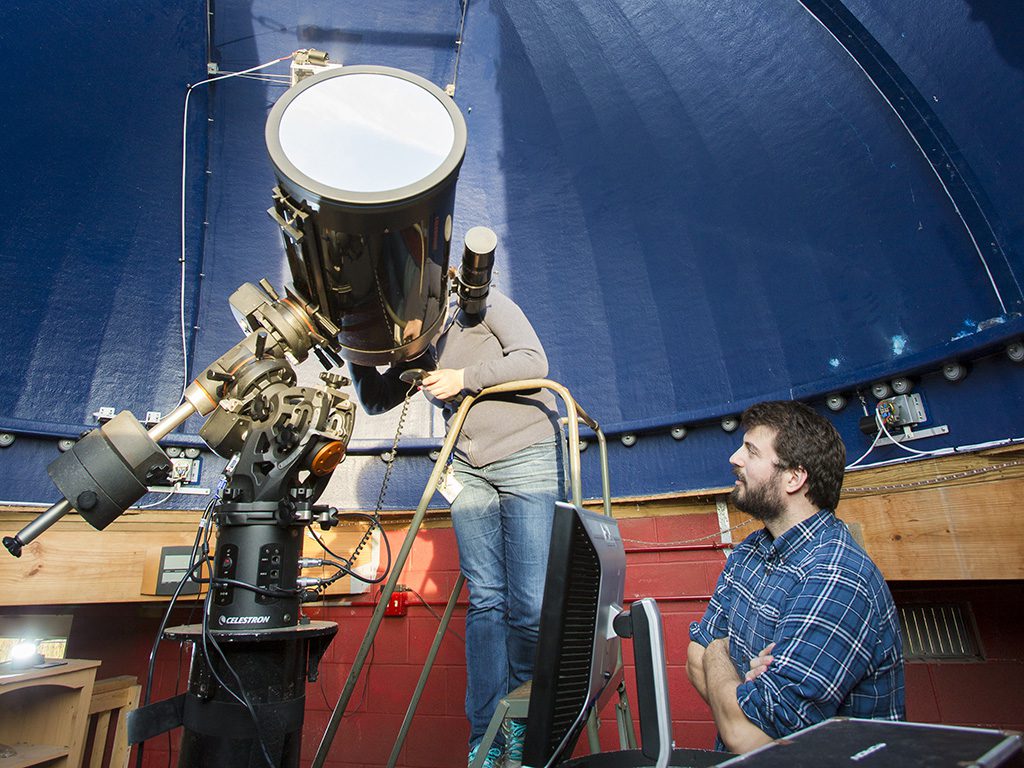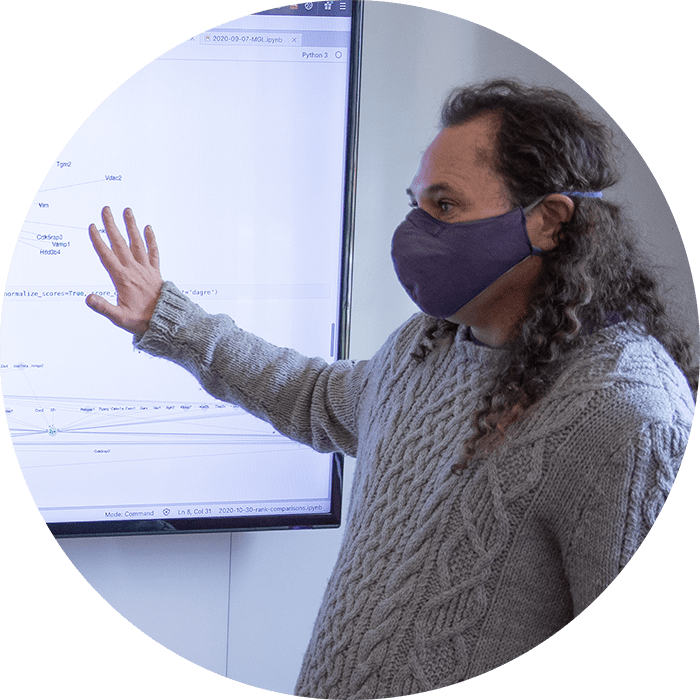Physics and Astronomy
The study of physics not only contributes to your understanding of the physical environment—it also develops your abilities to reason analytically and to test hypotheses. Physics and astronomy majors pursue careers in education, engineering or other technical disciplines, and other industries.
Earlham also offers a 3-2 pre-professional program in engineering, in which you’ll take foundational science and distribution courses at Earlham for three years, then spend an additional two years earning an engineering degree at an accredited engineering school. This allows you to emphasize the liberal arts in your education while still obtaining the technical aspects of an engineering degree.

Start your adventure
Sign up for more information about Earlham College.
Earlham ranks 64th nationally (in the 95th percentile) in the percentage of graduates receiving Ph.D.s in physics. Recent graduates have been admitted to graduate programs in plasma and particle physics, robotics and biophysics at institutions such as University of Minnesota, Johns Hopkins University and University of Maryland, to name a few.
Exploring the universe, from quarks to the cosmos
Many of these projects are interdisciplinary, involving mathematicians, computer scientists, biochemists and chemists working on the same projects. Others focus purely on physics, astronomy and cosmology. Still, others focus on decolonizing science.
Off-campus research
In addition to a variety of on-campus research opportunities, you can also do research off-campus through summer REU programs at institutions like Purdue University, the University of Michigan and the Ecole Polytechnique in Paris.
3-2 pre-professional engineering option
If you’re interested in an engineering career, Earlham partners with other schools to offer a 3-2 pre-professional engineering program. Spend three years taking your foundational science courses at Earlham and two at an accredited engineering school.

Our faculty
Our faculty have broad interests ranging from cosmology to biophysics, to engineering. We create an inclusive environment that actively welcomes all Earlham students.
Frequently asked questions
A physics major prepares students for careers in secondary education, engineering or other technical disciplines. Some of our students even go on to medical or law school, scientific consulting or other careers.
Earlham’s 3-2 pre-professional engineering option provides a wonderful opportunity if you’re considering a career in engineering but also want the experience of a broad, liberal arts education that is seldom available in engineering schools.
By combining three years at Earlham with two years at an engineering school, you can emphasize the liberal arts as well as the technical aspects of your education.
The Earlham pre-engineering program permits you to complete the B.A. degree requirements at Earlham and the engineering requirements at a professional engineering school with the aim of becoming a practicing engineer in industry, government or at a university.
Typically this type of program involves three years at Earlham studying fundamental science and the liberal arts, followed by two years of specialization at an affiliated engineering school. At the end of those five years, you will receive two degrees: a B.A. from Earlham in pre-engineering studies and a B.S. from the engineering program.
Pre-engineering requirements in the sciences depend on the engineering program to which you transfer, but most programs have requirements such as these:
- One year of physics (PHYS 125, 235)
- One year of chemistry (usually CHEM 111, 331)
- Mathematics through Differential Equations and Multivariate Calculus (MATH 180, 280, 320 and 350)
- One semester of computer programming (CS 128)
Some programs include additional courses such as economics (required by Columbia) or additional courses in biology, chemistry or electronics (if you have a particular interest such as biomedical or electrical engineering).
Recent physics majors have interned at places like the Max Planck Biophysical Chemistry Institute in Germany and at companies working on technology like artificial intelligence.
In addition, there are many opportunities for you to engage in research experiences both on and off-campus, and many students do summer Research Experiences for Undergraduates (REUs) around the world.
Yes! We strongly encourage you to speak with your faculty adviser as early as possible about your interest in off-campus study. This allows your adviser to help you create a four-year plan that incorporates an off-campus semester into your coursework. The Oak Ridge Science Semester is also an excellent option if you wish to spend a semester off-campus.
Through our 3+1 Education Program, you can earn a Bachelor of Arts (B.A.), Master of Arts in Teaching (M.A.T.) and teaching license—all in just nine semesters.
You’ll leave Earlham with two degrees, licensed to teach grades 5-12 in Indiana. (And it’s easy to transfer your license to other states—many of our graduates do!)
Physics majors are problem solvers. They love learning how things work in the physical world and using that knowledge to test new hypotheses and make discoveries.
If you’re considering a career in engineering, scientific research or physics education, the physics major could be the right option for you.



